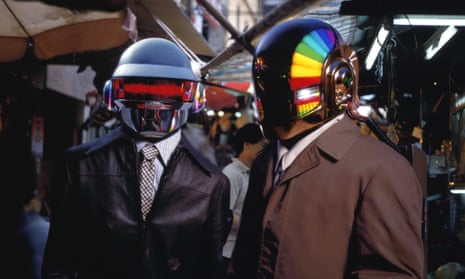Daft Punk, the French duo whose sci-fi aesthetic and euphoric sense of pop transformed electronic music, have split up.
They announced the split with a YouTube video featuring a clip from their film Electroma, featuring an intertitle with the dates 1993-2021. Their publicist Kathryn Frazier confirmed the split to Pitchfork, but did not elaborate.
The breakup marks the end of a 28-year partnership between Thomas Bangalter and Guy-Manuel de Homem-Christo, who formed in Paris having previously played together in the rock band Darlin. That group’s work had been disparagingly described as a “daft punky thrash” in a Melody Maker review, giving the pair the name of their next project.
Powered by the infectious UK Top 10 singles Da Funk and Around the World, they released their debut album Homework in 1997, which also reached the Top 10.
The pair were rarely pictured together or in their music videos, which were impressive high-concept affairs directed by the likes of Michel Gondry and Spike Jonze. But for the second album, Discovery, in 2001, they debuted what became their enduring public image: a pair of masked robots. The album contained the UK No 2 hit One More Time as well as tracks including Digital Love and Harder, Better, Faster, Stronger, and the pair became the biggest stars of the “French Touch” dance music scene.
Their third album, Human After All (2005), was slightly less well received, but it, along with their previous work, formed the backbone of one the most critically acclaimed live shows in history, featuring the pair playing from a giant light-up pyramid. It debuted at Coachella festival in 2006. Performances from the subsequent world tour formed their second live album, Alive 2007, following on from Alive 1997 a decade earlier, which was recorded at a Birmingham nightclub.
Their biggest hit was Get Lucky, which reached No 1 across the world in 2013, featuring Pharrell and Nile Rodgers. It was the lead single from their fourth studio album, Random Access Memories, released later that year, which also featured collaborations with Giorgio Moroder, Julian Casablancas and others.
In 2016, they produced the title track of the Weeknd’s hit album Starboy – which became their first US No 1 single – as well as the album’s closing track, I Feel it Coming. Their production skill was courted by other stars, including Kanye West, who sampled Harder, Better, Faster, Stronger for his hit single Stronger before recruiting them to co-produce four tracks from 2013 album Yeezus.
Daft Punk were nominated for 12 Grammy awards, of which they won six. Four of those wins came in 2013 for Random Access Memories and Get Lucky, including record and album of the year.
The duo were also involved in a number of film projects. Electroma (2006) was a sci-fi film directed and written by the pair about two robots who attempt to pass as humans. It was premiered in the Director’s Fortnight section of the Cannes film festival.
They also wrote and produced Interstella 5555, an anime film to accompany the release of Discovery, and provided the soundtrack to Tron: Legacy (2010), as well as briefly appearing in the film.

Comments (…)
Sign in or create your Guardian account to join the discussion